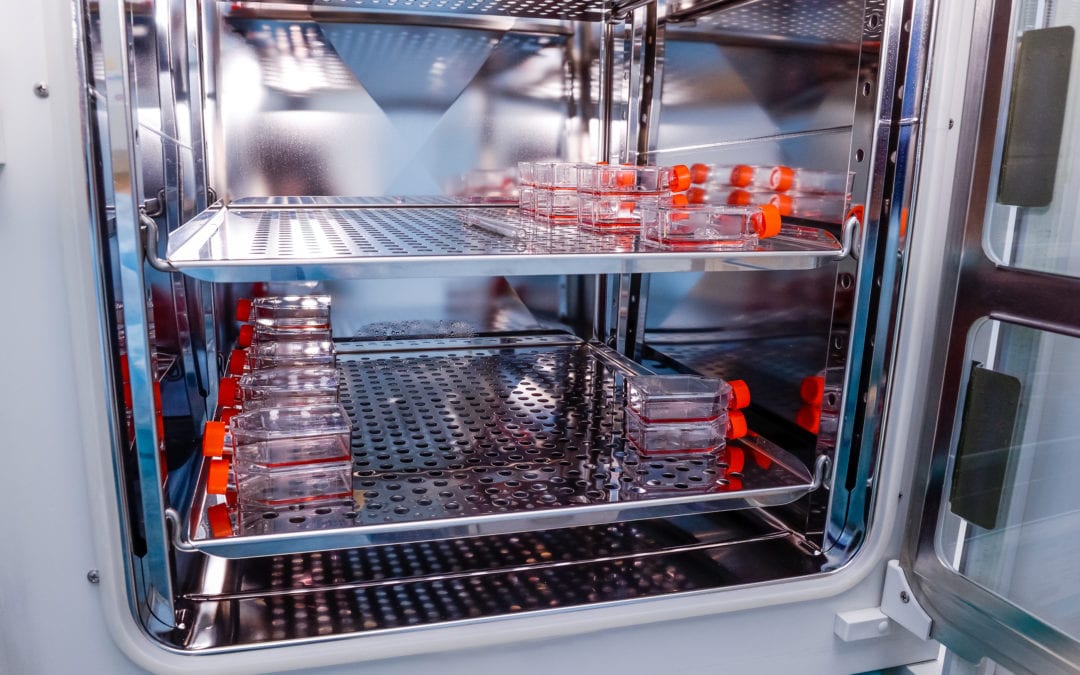The Importance of Maintaining Your Co2 Incubators Cells are very particular about the type of environment they thrive in. Being extremely sensitive to changes in temperature, humidity and pH, it’s important to house your cell cultures in an atmosphere that closely mimics an in vivo environment. CO2 incubators make culturing cells much easier. By maintaining stable environment conditions, CO2 incubators promote cell health and replication. But conditions inside your CO2 incubator can change rapidly if your unit is not properly maintained. When these environmental changes occur, the health and viability of your cells may be compromised. This is why proper maintenance of your CO2 incubator is so important. By following this guideline, you will ensure your unit is maintaining an optimum environment for your cell cultures.
Monitor CO2 Levels
In order to ensure optimal pH for cell growth, the CO2 concentrations need to be just right. Modern CO2 sensors do a decent job of giving accurate readings, but it’s also a good idea to use an external gas analyzer to get the most accurate reading possible. You should check your levels every couple of months. If the CO2 levels seem off, run an Autostart cycle (if possible) or contact a factory trained service specialist for help.
Get Rid of Contaminants
No matter how sterile of an environment you try to create, your lab will always have some contaminants. The good news is, by maintaining good lab practices, you can minimize the chances of these contaminants getting into your CO2 incubator and negatively impacting the health of your cell cultures. When cleaning your incubator, always use a disinfectant that includes 70% ethanol or a quaternary ammonium-based disinfectant. Avoid using any products that contain harsh chemicals that could corrode your incubator and affect the growth of your cultures.
Maintain Proper Humidity
It’s very important to maintain the right humidity levels inside your CO2 incubator. Should humidity levels change, you risk water evaporation from your growth media and the remaining nutrients becoming too concentrated. Check your interior water tray frequently to ensure you have an adequate level of distilled water in there. Once a week, dump out the old water, rinse the trays and refill them with fresh distilled water. This will keep microorganisms from colonizing your water tray.
Replace the HEPA Filter
The HEPA filter inside your unit is responsible for capturing all kinds of microorganisms, dust particles, and even volatile organic compounds (VOCs), all of which can make your cells sick. You should replace your HEPA filter yearly. Hopefully your unit is capable of filtering the entire chamber’s air volume every 60 seconds to achieve ISO Class 5 cleanroom conditions in 5 minutes following even a long 30 second door opening. It doesn’t take much for the environmental conditions inside your CO2 incubator to change, and when they do, they can have a disastrous effect on your cultures. You can prevent this from happening by following these tips.
How Often Do I Need to Calibrate My CO2 Incubator?
A conversation about CO2 incubator maintenance would not be complete without mentioning the importance of calibration. We have found with most clients that CO2 incubator calibration is the one maintenance procedure they often forget about. And then they end up calling us when something very bad happens. These are the things that usually happen (AKA go wrong!) when you don’t calibrate your unit:
Your Temperature Readings Become Unreliable
Inaccurate temperature readings often result in slow growth, media dessication and cell culture death.
Your CO2 and O2 Readings May Also Become Faulty
It is vitally important that the CO2 and O2 levels inside your incubator closely mimic the conditions found inside the human body.
Humidity Levels May Not Read Correctly
Your cultures require just the right humidity levels. Should these levels drop, and you are unaware of the change, your culture media will dry up and your cells will die. How Often Should A CO2 Sensor Be Calibrated? Different service technicians will have different opinions on the answer to this question. Generally speaking, the more accurate CO2 level reading that is required, the more often your CO2 sensors should be calibrated.
Our professional opinion, and it’s one we’ve based on years of experience in the field, is that there should be a weekly CO2 sensor calibration to ensure correct function of the unit. What often happens is that the unit’s gauge will read a completely different level than the actual calibration reading. This is not ideal for the reasons we listed above.
Work with a Company Built on Trust and Excellence
SciTech Lab Services is an Alabama State certified refrigeration contractor specializing in the sales and service of laboratory and medical equipment in the Birmingham area. We’ve been repairing installing and repairing laboratory equipment for 15 years. We have extensive knowledge and experience in installing, repairing, and servicing CO2 incubators for laboratories both large and small. If your unit needs servicing or you have any other questions about properly maintaining your CO2 incubator, please feel free to give us a call.
Besides installing and servicing CO2 incubators, we offer an extensive list of lab services, including:
- Percentage CO2 calibration to 5% CO2 to make sure the sensor is accurate for optimal cell growth
- Fan motor repair and replacement
- Temp and CO2 sensor replacement
- Overall Electrical function testing
- Humidity controls and sensor replacement and calibration
- Gasket cleaning and making sure that they are meeting in unison
Installation - Decontamination of units
- Proper CO2 regulator installation and setup – correcting the use of Teflon tape
- Installation of CO2 tubing from regulator to the unit or a tank switch
Scitech Labs is also an authorized Comark distributor. We are highly knowledgeable of most Comark systems and can install and repair them for you.


Recent Comments